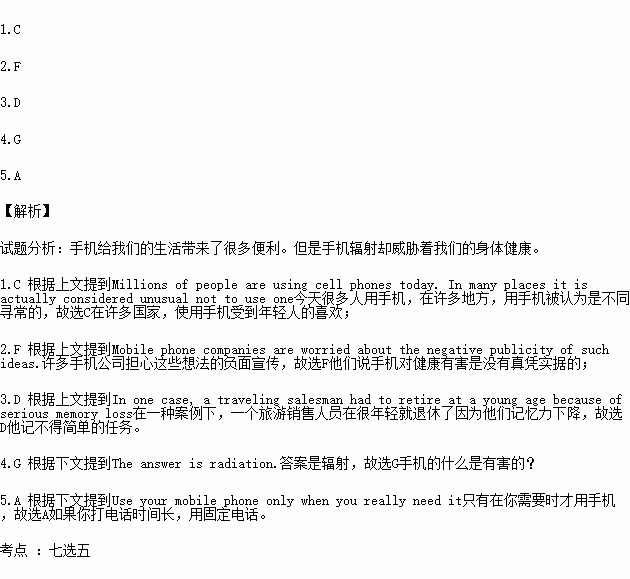题目内容
根据短文内容,从短文后的选项中选出能填入空白处的最佳选项。选项中有两项为多余选项。
Cell Phones: Hang Up or Keep Talking?
Millions of people are using cell phones today. In many places it is actually considered unusual not to use one. __1.__They find that the phones are more than a means of communication----having a mobile phone shows that they are cool and connected.
The explosions around the world in mobile phone use make some health professionals worried. Some doctors are concerned that in the future many people may suffer health problems from the use of mobile phones. In England, there has been a serious debate about this issue. Mobile phone companies are worried about the negative publicity of such ideas. ___2.___
On the other hand, why do some medical studies show changes in the brain cells of some people who use mobile phones? Signs of change in the tissues of the brain and head can be detected with modern scanning(扫描)equipment. In one case, a traveling salesman had to retire at a young age because of serious memory loss. ___3.__He would often forget the name of his own son. This man used to talk on his mobile phone for about six hours a day, every day of his working week, for a couple of years. His family doctor blamed his mobile phone use, but his employer's doctor didn't agree.
____4.__ The answer is radiation. High-tech machines can detect very small amounts of radiation from mobile phones. Mobile phone companies agree that there is some radiation, but they say the amount is too small to worry about.
As the discussion about their safety continues, it appears that it's best to use mobile phones less often.___ 5.__Use your mobile phone only when you really need it. Mobile phones can be very useful and convenient, especially in emergencies. In the future, mobile phones may have a warning label that says they are bad for your health. So for now, it's wise not to use your mobile phone too often.
A. Use your regular phone if you want to talk for a long time.
B. They will possibly affect their benefits.
C. In many countries, cell phones are very popular with young people.
D. He couldn’t remember even simple tasks.
E. What do the doctors worry about?
F. They say that there is no proof that mobile phones are bad for your health.
G. What is it that makes mobile phones potentially harmful?
 课堂练加测系列答案
课堂练加测系列答案 轻松课堂单元测试AB卷系列答案
轻松课堂单元测试AB卷系列答案Admission
Reservations are not necessary to visit The Huntington. Tickets may be purchased at the time of your visit.
Weekdays | Weekends | |
Adults | $20 | $23 |
Seniors ( age 65+ ) | $15 | $18 |
Students (age 12-18, or with full-time student I.D.) | $12 | $13 |
Youth (age 5-11 ) | $8 | $8 |
Children (under 5) | free | free |
Groups ( 15 or more ) | $11 ( per person ) | $14 ( per person ) |
Members | free | free |
Free Day
Admission to The Huntington is free to all visitors on the first Thursday of every month with advance tickets. Hours on Free Day are 10:30 a.m. – 4:30 p. m. Please notice that Free Day tickets are not available at The Huntington, and can only be reserved by phone or online. You may not purchase regular admission tickets on Free Day.
Parking
Parking is free at The Huntington. And no parking reservations are necessary unless you are a school or tour group arriving by bus.
Bus Reservations for Groups
Groups arriving by bus must make reservations in advance by calling 626-405-2240. Please notice that all buses and tricks must use a specified (规定的) route for entering The Huntington from the north.
1.If next Saturday a 66-year-old man goes to the library with his three grandchildren, aged 4, 6, 14, how much should he pay?
A. $40 B. $35 C.$ 39 D. $44
2.To visit the library on free days, you_______.
A. must reserve a parking place
B. should reserve tickets in advance
C. have to buy admission tickets
D. get free tickets on arriving at the library
3.As for tour groups arriving at the library by bus, _______.
A. they have to pay for the parking space
B. they have to park their bus outside
C. they don’t need to make a reservation
D. they should call the library in advance

